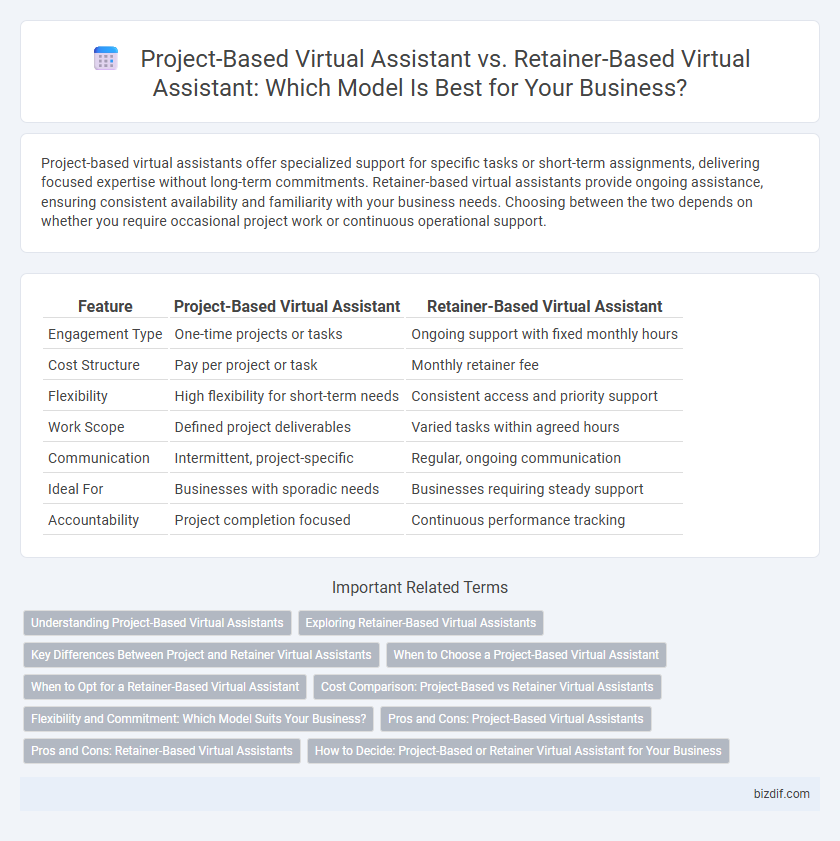Project-based virtual assistants offer specialized support for specific tasks or short-term assignments, delivering focused expertise without long-term commitments. Retainer-based virtual assistants provide ongoing assistance, ensuring consistent availability and familiarity with your business needs. Choosing between the two depends on whether you require occasional project work or continuous operational support.
Table of Comparison
| Feature | Project-Based Virtual Assistant | Retainer-Based Virtual Assistant |
|---|---|---|
| Engagement Type | One-time projects or tasks | Ongoing support with fixed monthly hours |
| Cost Structure | Pay per project or task | Monthly retainer fee |
| Flexibility | High flexibility for short-term needs | Consistent access and priority support |
| Work Scope | Defined project deliverables | Varied tasks within agreed hours |
| Communication | Intermittent, project-specific | Regular, ongoing communication |
| Ideal For | Businesses with sporadic needs | Businesses requiring steady support |
| Accountability | Project completion focused | Continuous performance tracking |
Understanding Project-Based Virtual Assistants
Project-based virtual assistants specialize in completing specific tasks with clearly defined objectives and deadlines, making them ideal for temporary or one-time projects. Their expertise allows businesses to scale operations efficiently without long-term commitments. These assistants offer flexibility in hiring and payment, as they are contracted per project rather than on an ongoing basis.
Exploring Retainer-Based Virtual Assistants
Retainer-based virtual assistants provide ongoing, flexible support tailored to evolving business needs, ensuring consistent availability for tasks such as calendar management, customer follow-ups, and social media monitoring. This model fosters long-term collaboration, allowing for deeper understanding of company processes and proactive problem-solving. Businesses benefit from predictable monthly costs and enhanced productivity by leveraging a retainer-based arrangement for continuous virtual assistance.
Key Differences Between Project and Retainer Virtual Assistants
Project-based virtual assistants handle specific tasks or short-term assignments with clear deadlines and defined deliverables, ideal for one-time projects or occasional support. Retainer-based virtual assistants provide ongoing support with a consistent monthly fee, ensuring availability for multiple tasks and long-term collaboration. The key differences lie in commitment length, payment structure, and flexibility, where project-based VA offers cost-efficiency for limited needs, and retainer-based VA ensures reliable access and prioritization.
When to Choose a Project-Based Virtual Assistant
A project-based virtual assistant is ideal for businesses with specific, one-time tasks such as launching a marketing campaign or organizing an event, providing flexibility and cost control. They offer specialized skills tailored to the project's scope without long-term commitments, making them suitable for short-term, clearly defined objectives. Choosing a project-based virtual assistant maximizes efficiency for isolated projects requiring precise deliverables within a set timeline.
When to Opt for a Retainer-Based Virtual Assistant
A retainer-based virtual assistant is ideal for businesses requiring consistent, ongoing support such as administrative tasks, customer service, or digital marketing management. Companies experiencing fluctuating workloads or seasonal demands benefit from the flexibility and priority access a retainer agreement provides. Long-term collaborations foster deeper understanding of business processes, enhancing efficiency and personalized assistance.
Cost Comparison: Project-Based vs Retainer Virtual Assistants
Project-based virtual assistants offer a fixed price per assignment, ideal for short-term or one-time tasks, often resulting in lower immediate costs but less ongoing support. Retainer-based virtual assistants require a monthly fee, providing consistent availability and long-term cost efficiency through prioritized service and scalability. Evaluating workload frequency and budget predictability helps determine the most cost-effective choice between project-based and retainer agreements.
Flexibility and Commitment: Which Model Suits Your Business?
Project-based virtual assistants offer flexibility by allowing businesses to engage support for specific tasks without long-term commitments, ideal for fluctuating workloads. Retainer-based virtual assistants provide consistent availability and deeper integration with company operations, fostering stronger collaboration and ongoing support. Choosing between these models depends on your business's need for adaptability versus stable, continuous assistance.
Pros and Cons: Project-Based Virtual Assistants
Project-based virtual assistants offer flexibility by handling specific tasks or projects with clear deadlines, making them ideal for one-time or irregular work without long-term commitments. This model allows businesses to control costs and assess assistant performance before deciding on extended collaboration. However, limited continuity and potential onboarding times for each new project can hinder efficiency and disrupt workflow consistency.
Pros and Cons: Retainer-Based Virtual Assistants
Retainer-based virtual assistants offer consistent support with a fixed monthly fee, ensuring priority access and reliable availability, which is ideal for businesses needing ongoing tasks management. The main advantage lies in cost predictability and the development of a long-term working relationship, enhancing efficiency over time. However, commitments may lead to underutilization if workload fluctuates, potentially resulting in higher expenses compared to project-based alternatives.
How to Decide: Project-Based or Retainer Virtual Assistant for Your Business
Choosing between a project-based virtual assistant and a retainer-based virtual assistant depends on your business needs and workload consistency. Project-based assistants are ideal for specific, short-term tasks or one-off projects, offering flexibility and cost control without long-term commitments. Retainer-based virtual assistants provide ongoing support, ensuring continuous availability and deeper integration with your business operations, which benefits companies with regular or evolving administrative demands.
Project-based virtual assistant vs Retainer-based virtual assistant Infographic

 bizdif.com
bizdif.com